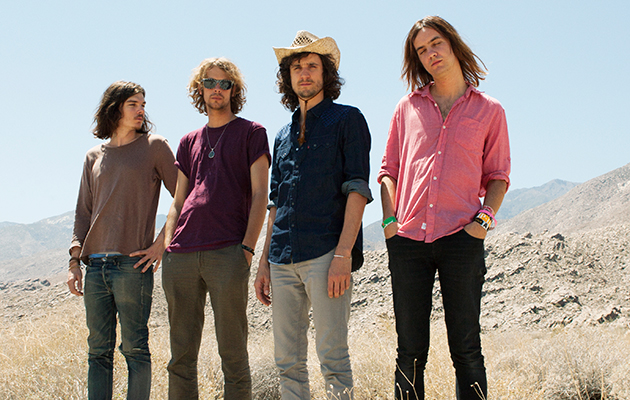This is where Troy Terrace comes into the Tame Impala story. It’s the house in Perth where Parker lived in legendary communal squalor with like-minded types, similarly into music and drugs, a scene with Kevin in some accounts at its charismatic centre, a notion Nick cheerfully contests.
“It’s not like Kev was some kind of Psychedelic Jesus, who gathered all these people around him, like disciples,” he tells Uncut at Coachella, Sonic Distortion making a racket in the background. “We were always a gang, living in the same house, sharing everything. The music scene in Perth at the time was like a series of little music houses. Ours was the psychedelic house. We were flag-bearers for stoner rock.”
“We look back on Troy Terrace so romantically now,” says Parker, “but we lived in fucking squalor. I can smell it now, sitting here. The smell of stale air and the constant reek of tobacco and weed. Everyone who lived there was a musician, so the whole house was full of musical shit, instruments, amps. I recorded mostly in my bedroom. I loved it there. It was the most creative environment I’d ever lived in. We all had like 10 bands we were in, usually at the same time. Nick had Mink Mussel Creek. I had The Dee Dee Dums, who were kind of bluesy psych rock. At the time, I was into a lot of stoner rock – Queens Of The Stone Age, The Black Keys, White Stripes, Kyuss as well as Cream and Jimi Hendrix. Gradually, there was a shift in what we did, away from guitar-based blues-rock. Slowly, song by song, we became a lot more melodic and groovy and lush and that was the beginning of Tame Impala.”
Although they played live as a band, it was understood by everyone that if things went further, Tame Impala on record would be just Parker, which caused some confusion when they were signed to hip Australian independent, Modular – “the day everything turned upside down,” according to Kevin. The deal done, talk turned to getting ‘the band’ into the studio to record an album.
“At that point, I had to say, ‘Look, you know I just record on my own in my bedroom, don’t you? You know that’s the deal, right? You know it’s going to be me in a room with some microphones and some instruments or whatever?’
Fortunately, they were cool with me producing the album, although they wouldn’t let me mix it. I tried to convince them I could do a good enough job, I kept sending them mixes, but they were like, ‘Fuck it. We’re bringing someone else in.’ I told them, ‘No fucking way.’ I kept turning down everyone they suggested.”
Modular then told him they’d been in contact with Dave Fridmann, knowing Parker was a fan of his work with The Flaming Lips, Mercury Rev and MGMT.
“They said they were going to get him to call me, which he did. I was suddenly talking to Dave Fridmann. That seemed pretty cool. It was still pretty weird, though. He was this guy I just totally looked up to and was in awe of. At the same time, I’d never handed one of my babies over to anyone to fuck with. I wanted him to do his own thing, to put the Dave Fridmann touch on it, but I didn’t know how to hand over the music. I didn’t know how to let him do his own thing. He’d do a mix and it would sound awesome, but not how I would have done it. I kept trying to get him to change it, to turn this up and turn that up, turn everything up. And he’d be going, ‘You can’t do it like that. It’s just not going to work if you turn everything up. You just can’t do that.’ Of course, he was right and I learned a lot of lessons mixing Innerspeaker that made Lonerism a lot easier for both of us. I didn’t know what the fuck I was doing with the first album.”


